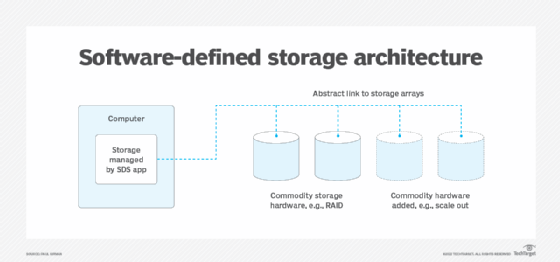
Explore 9 software-defined storage companies
Software-defined storage offerings are all over the map in uses, features and types of platform. These nine software-defined storage companies include several IT giants.
Software-defined storage has revolutionized data storage in recent years. The technology enables organizations to abstract storage allocation and management from the underlying storage hardware.
Numerous vendors offer SDS products, but each has its own approach to the technology. Some offer a range of products, so admins should know how they compare. Below is a list, in alphabetical order, of nine software-defined storage companies and key products.
1. DataCore
DataCore offers two SDS products.
SANsymphony for block storage derives high performance from commodity hardware through mechanisms such as parallel I/O, high-speed caching, automatic tiering and zero-touch failover. Admins can also configure SANsymphony for high availability and remote site replication.
Swarm, DataCore's product for software-defined object storage, can pool together x86 servers equipped with HDD or SSD storage into a self-managed and self-healing architecture. Users can manage the entire architecture through a single web console and access data through both S3 and HTTPS.
2. Dell Technologies
While many software-defined storage companies may offer one or two SDS products, Dell has at least five, each with a specific use. Many of these products continue to be VMware-oriented, in spite of Broadcom's VMware acquisition.
VxRail, for example, is an HCI platform for VMware environments. VMware users might also benefit from Dell's UnityVSA, which is a software version of its Unity hardware platform and serves as a VMware virtual appliance.
In addition, Dell offers Unity Cloud Edition. Like UnityVSA, Unity Cloud Edition is a software-defined version of the Unity platform, but admins can deploy it in public cloud environments.
IsilonSD Edge is a software-defined scale-out NAS system that can support multiple workloads. Similarly, Dell offers a highly scalable, software-defined object storage system called ECS.
3. Microsoft
Microsoft provides software-defined storage capabilities through its Storage Spaces Direct feature, which is a part of Windows Server.
Storage Spaces Direct is meant to act as an alternative to pricy storage appliances. Multiple Windows Servers can be tied together in a way that enables their local storage to be pooled. This pooled storage can then serve as a high-performance storage system from which users can provision scalable and resilient storage.
4. NetApp
NetApp provides SDS capabilities through its OnTap data management software.
OnTap acts as a unified management plane for on-premises and cloud storage. It supports both NetApp storage systems and commodity storage hardware. The OnTap software can allocate or scale storage based on capacity, performance, availability requirements or a combination of the three. Object storage workloads scale up to 707 petabytes (PB). A single namespace can accommodate up to 60 PB or 400 billion files.
OnTap provides numerous security features, such as the ability to require multiple administrators to approve certain changes and autonomous ransomware defenses that use machine learning to identify threats.
Additionally, OnTap uses automation to keep storage healthy and secure. The NetApp Active IQ feature acts as an advisor that delivers risk assessments, predictive alerts and prescriptive guidance.
5. Nutanix
Nutanix delivers SDS through its Unified Storage. Nutanix Unified Storage brings siloed data together under a single management interface that works with on-premises and multi-cloud environments. The platform supports a mixture of file, block and object storage.
Nutanix protects managed data through the cloud-based service Data Lens. It takes advantage of Nutanix software's ability to provide a global view of an organization's storage by reporting on data access and data movement. Data Lens also provides comprehensive protection against ransomware, real-time threat monitoring and the ability to detect anomalous data access. The Nutanix cloud-based ransomware signature database can identify and guard against several thousand types of ransomware.

6. Pure Storage
Pure Storage offers software-defined storage capabilities through its Purity OS, which is on the company's FlashArray line of storage hardware and in Pure Cloud Block Store. It uses AI to analyze and monitor the storage hardware to ensure 99.9999% availability.
Purity emphasizes data security with always-on encryption and integrated DR. Additionally, Purity enables nondisruptive storage upgrades.
Purity enables intelligent management with the ability to monitor, analyze and optimize storage, regardless of whether it is cloud-based or resides on-premises.
7. Red Hat
Red Hat Ceph Storage is similar to Microsoft's Storage Spaces Direct in that it allows multiple servers to work together as a cohesive storage platform.
Data is automatically distributed across multiple servers, making the data resilient against failures. Red Hat Ceph Storage is highly scalable, making it suitable for use as a backup repository or for workloads that require vast amounts of data. Red Hat Ceph Storage supports block, object and file storage.
8. StarWind
StarWind offers two SDS products.
StarWind HCI Appliance combines compute, networking and storage hardware into a single modular product, based on hardware from Intel, Dell, Supermicro, Solidigm and Nvidia. The product requires a minimum of two nodes, but it can use larger numbers of nodes to improve scalability. StarWind also offers a virtual HCI appliance that can run on VMware, KVM or Hyper-V.
StarWind Virtual SAN is primarily for SMBs, but it also works for edge storage and enterprise remote and branch offices. It acts as highly available (99.9999%) shared storage that is compatible with any hypervisor. Admins can deploy as little as two nodes, though it is recommended to have at least three.
9. StorMagic
StorMagic offers SDS through its SvSAN.
SvSAN is designed primarily for edge computing environments, such as branch offices that need SAN-like capabilities, but without the cost of a traditional SAN. SvSAN is versatile and can work with as little as two x86 servers with a gigabyte of RAM each. It also requires a witness server. SvSAN spans two servers to keep data secure and to make it highly available through synchronous mirroring.
Users can deploy StorMagic SvSAN to physical hardware or as a VM with Microsoft Hyper-V, VMware vCenter and other popular hypervisors.
How to choose a software-defined storage company
Scalability and performance are often the first considerations, followed by cost, performance, reliability and high availability. However, there are some other important criteria to take into account.
Compatibility is crucial. Some software-defined storage companies might, for example, support only block or only object storage, while others support any combination of block, object and file storage. Similarly, users must consider how well the product will integrate with current storage hardware and cloud storage. In addition to supporting raw storage, the product should work with any hypervisors and be compatible with common cloud storage platforms.
Finally, a vendor should have a proven track record and provide support around the clock.
Brien Posey is a former 22-time Microsoft MVP and a commercial astronaut candidate. In his more than 30 years in IT, he has served as a lead network engineer for the U.S. Department of Defense and a network administrator for some of the largest insurance companies in America.






